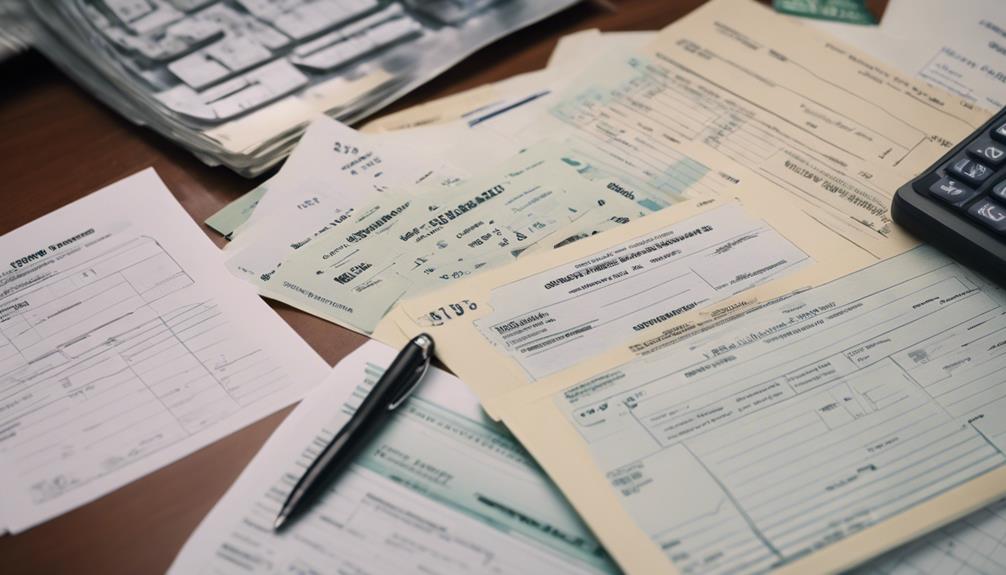To apply for New Jersey Medicaid, you must gather paperwork like proofs of eligibility, income, assets, residency, and ID. Ensure all forms are accurate and complete, detailing household info, income sources, and assets. Provide tax returns, pay stubs, bank statements, and investment details for income verification. Evidence of property ownership, investment accounts, and all assets is crucial. Show residency with utility bills, rental agreements, or official documents. Present valid IDs like driver's license, passport, or birth certificate. These documents are essential for Medicaid approval and ensuring your application meets the necessary criteria.
Eligibility Verification
To verify your eligibility for New Jersey Medicaid, you'll need to provide specific documentation and information. The application process for New Jersey Medicaid involves filling out forms that inquire about your household size, income, assets, and other relevant details. It's crucial to accurately complete these forms to ensure the eligibility criteria are met.
Once you have submitted your application, the next step is the documentation submission. You may be required to provide documents such as proof of identity, residency, citizenship, income, and any additional information requested by the Medicaid office. These documents play a vital role in determining your eligibility for the program.
After submitting the necessary documentation, the verification process begins. Medicaid officials will review the information provided to confirm that you meet the eligibility criteria outlined by the state. It's essential to respond promptly to any requests for additional information during this process to avoid delays in your application.
Income Documentation
When applying for New Jersey Medicaid, you must provide proper documentation regarding your income to verify eligibility. To demonstrate your income, you'll need to submit various forms of documentation. This includes recent tax returns, pay stubs reflecting your wages, and any additional sources of income you may have.
Tax returns are essential for showing your annual income, while pay stubs provide a snapshot of your current earnings. These documents help Medicaid determine if your income meets the eligibility criteria.
In addition to tax returns and pay stubs, bank statements are also necessary for income verification. Bank statements offer a comprehensive view of your financial transactions, including deposits and withdrawals. These statements help confirm the income details provided in your tax returns and pay stubs.
Financial records such as investment statements or retirement account statements may also be required to assess all sources of income accurately. By presenting a thorough documentation of your income, you can expedite the Medicaid application process and ensure eligibility verification.
Asset Information
How should you provide documentation for your assets when applying for New Jersey Medicaid? Asset verification is a crucial part of the application process. You'll need to provide thorough financial disclosure, including details on property ownership and investment accounts.
For property ownership, be prepared to show documents such as deeds or property tax statements. Investment accounts should be documented through statements from financial institutions showing the current value of the accounts.
When it comes to asset verification, New Jersey Medicaid requires a comprehensive overview of all your assets to determine eligibility. Make sure to gather all relevant paperwork and ensure that the information provided is accurate and up to date.
Transparency is key when disclosing your assets, as any discrepancies could lead to delays in the application process. By being organized and thorough in your asset documentation, you can help streamline the Medicaid application process and ensure that you meet all the necessary requirements for eligibility.
Proof of Residency
When it comes to determining your eligibility for New Jersey Medicaid, providing proof of residency is a necessary step in the application process. Residency requirements for New Jersey Medicaid entail that you must be a resident of the state of New Jersey to qualify for benefits.
The verification process for residency typically involves submitting documents that prove your current address within the state. Address documentation accepted for proving residency may include utility bills, rental agreements, mortgage statements, or official government correspondence that shows your name and current New Jersey address.
It's essential to ensure that the documents provided are recent and accurately reflect your residency status. Additionally, the residency duration plays a crucial role in meeting the eligibility criteria. New Jersey Medicaid may require individuals to have a continuous residency in the state for a specified period to qualify for benefits.
Ensuring you have the necessary documentation to prove your New Jersey residency is vital to successfully complete the Medicaid application process and secure the healthcare coverage you need.
Identification Documents
To verify your identity for your New Jersey Medicaid application, you'll need to provide specific identification documents. During the application process, you must submit copies of documents that confirm your identity accurately. Commonly accepted identification documents include your driver's license, state-issued ID, passport, or birth certificate. These documents are crucial in the verification process to ensure that you're the rightful applicant for New Jersey Medicaid benefits.
It is essential to pay close attention to the required documents and submission deadlines outlined by the Medicaid office. Missing or incorrect identification documents can delay the processing of your application.
Make sure that the copies you provide are clear, legible, and up to date. The verification process relies heavily on the accuracy of the information you provide, so double-check that all identification documents are valid and match the details you have provided in your application.
Conclusion
Congratulations! You've gathered all the necessary paperwork for New Jersey Medicaid. Now, you're ready to submit your application and take the next steps towards accessing the healthcare coverage you need.
Just remember, in the grand scheme of things, this paperwork is just a drop in the bucket compared to the peace of mind and security that comes with having Medicaid coverage.
Good luck on your journey to better health!
